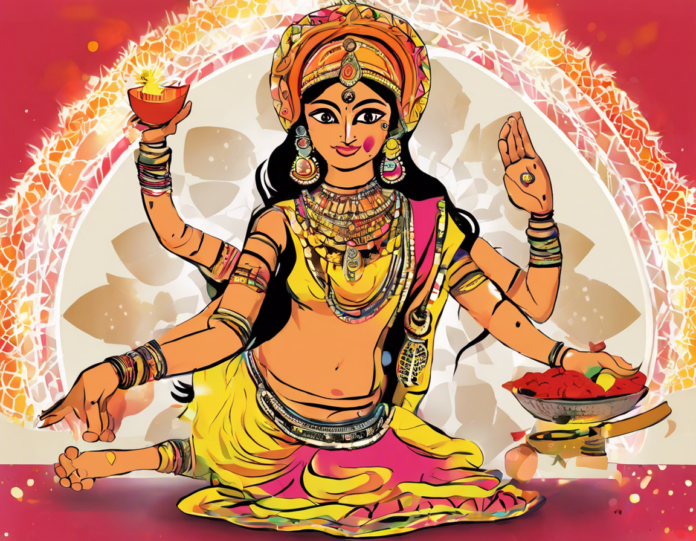Gupt Navratri, also known as Secret Navratri, is a powerful period of nine nights dedicated to the worship of Goddess Durga, which falls at an unconventional time of the year according to the Hindu lunar calendar. This auspicious occasion occurs twice a year, generally in April and October, and holds immense significance in Hindu culture and spirituality. While the widely celebrated Sharad Navratri in September/October is more popular, Gupt Navratri is equally special as it offers devotees a chance to delve into secret rituals and practices to enhance their spiritual growth and seek blessings from the divine.
Understanding the Significance of Gupt Navratri
-
Hidden Spiritual Power: The term “Gupt” means secret, and during these navratris, devotees are encouraged to engage in mystical practices and hidden rituals that are believed to amplify the spiritual power of the prayers and offerings made to the Goddess Durga.
-
Personal Transformation: Gupt Navratri symbolizes a time of introspection, renewal, and transformation. It is an opportunity for individuals to connect with their inner selves, shed negativity, and embrace positivity to embark on a journey towards self-improvement and enlightenment.
-
Powerful Energies: The cosmic energies during Gupt Navratri are considered particularly potent, making it an ideal time for meditation, chanting mantras, and performing rituals to harness these energies for personal growth, prosperity, and spiritual upliftment.
Unveiling the Rituals and Practices of Gupt Navratri
-
Meditation and Prayers: Devotees are encouraged to engage in meditation to calm the mind, recite mantras dedicated to Goddess Durga, and offer prayers seeking her blessings for protection, prosperity, and well-being.
-
Fasting: Fasting during Gupt Navratri is a common practice as it is believed to purify the body and mind, and enhance spiritual receptivity. Devotees often observe fasts where they abstain from consuming certain foods for the duration of the nine days.
-
Offerings and Pujas: Special poojas and havan ceremonies are performed by devotees to invoke the blessings of Goddess Durga. Offerings such as flowers, incense, fruits, and sweets are made to the deity as a symbol of devotion and gratitude.
-
Charity and Seva: Giving back to the community and engaging in acts of charity (daan) and service (seva) are considered auspicious during Gupt Navratri. By helping others and spreading positivity, individuals create good karma and attract blessings from the divine.
-
Spiritual Discourses and Satsangs: Attending spiritual discourses and Satsangs during Gupt Navratri can be highly beneficial as they provide insights into spiritual practices, philosophies, and teachings that can deepen one’s spiritual understanding and connection with the divine.
Top 5 Mantras for Gupt Navratri
-
Om Dum Durgayei Namaha – This mantra is dedicated to Goddess Durga and is chanted to seek her blessings for protection and courage.
-
Om Aim Hreem Kleem Chamundayei Vichche – Chanting this powerful mantra can help in overcoming obstacles and bringing success and prosperity.
-
Sarva Mangala Mangalye, Shive Sarvartha Sadhike – This mantra praises Goddess Durga as the harbinger of auspiciousness and fulfillment of all desires.
-
Om Hreem Shreem Kleem Sarva Poojitayei Namaha – Invoking this mantra can help in attracting blessings and divine grace during Gupt Navratri.
-
Ya Devi Sarva Bhuteshu Shakti Rupena Samsthita – This mantra acknowledges the universal presence of Goddess Durga’s divine energy within all beings.
Associated Benefits and Blessings of Observing Gupt Navratri
-
Protection and Strength: Devotees believe that by observing Gupt Navratri with sincerity and devotion, they can gain the blessings of Goddess Durga for protection, courage, and inner strength to face life’s challenges.
-
Spiritual Growth: The spiritual practices and rituals performed during Gupt Navratri are aimed at promoting spiritual growth, self-realization, and inner peace, leading to a deeper connection with the divine.
-
Fulfillment of Desires: It is believed that sincere prayers and offerings made during Gupt Navratri can help devotees in manifesting their desires, whether related to health, prosperity, relationships, or spiritual evolution.
-
Removal of Obstacles: By seeking the blessings of Goddess Durga during Gupt Navratri, devotees can overcome obstacles and challenges that may be hindering their progress in various aspects of life.
FAQs (Frequently Asked Questions) about Gupt Navratri
-
What is the significance of Gupt Navratri compared to Sharad Navratri?
Gupt Navratri is considered more esoteric and mystical compared to the more mainstream Sharad Navratri. It is believed to offer a deeper connection with the divine through secret rituals and practices. -
How long is Gupt Navratri observed, and when does it usually occur?
Gupt Navratri lasts for nine nights, similar to Sharad Navratri, and generally takes place in the months of April and October according to the Hindu lunar calendar. -
Is fasting mandatory during Gupt Navratri?
While fasting is a common practice during Gupt Navratri, it is not mandatory. Individuals can choose to fast partially or fully based on their health and personal capabilities. -
What are some traditional foods that can be consumed during Gupt Navratri fasting?
During Gupt Navratri fasting, individuals often consume satvik foods such as fruits, nuts, milk, potatoes, sendha namak (rock salt), and sama rice. -
Can non-Hindus participate in Gupt Navratri rituals and prayers?
Gupt Navratri is a spiritual and universal occasion, and people from all faiths and backgrounds are welcome to participate in the rituals, prayers, and meditations to seek blessings and spiritual growth. -
Are there any specific colors or dress codes associated with Gupt Navratri celebrations?
Devotees often wear yellow attire during Gupt Navratri, as it is considered auspicious and pleasing to Goddess Durga. However, there are no strict dress code requirements for the occasion. -
What is the best time of the day to perform rituals during Gupt Navratri?
The early morning hours, known as Brahma Muhurta, are considered highly auspicious for performing spiritual practices and rituals during Gupt Navratri due to the peaceful and spiritually charged atmosphere. -
Can children participate in Gupt Navratri celebrations and rituals?
Children can certainly participate in Gupt Navratri celebrations by engaging in devotional activities, art and crafts, and listening to spiritual stories related to Goddess Durga to instill values and spirituality from a young age. -
How can one continue the positive impact of Gupt Navratri beyond the nine days?
To sustain the positive energy and blessings received during Gupt Navratri, individuals can continue to practice meditation, chanting, self-reflection, acts of kindness, and offerings of gratitude in their daily lives. -
Are there any specific deities or forms of Goddess Durga worshipped during Gupt Navratri?
While all forms of Goddess Durga are revered during Gupt Navratri, devotees often focus on Siddhidatri – the ninth form of Durga, who is believed to give siddhis (divine powers) and spiritual blessings to her devotees.
In conclusion, Gupt Navratri offers a unique and spiritually enriching opportunity for individuals to connect with the divine feminine energy of Goddess Durga, engage in secret rituals and practices, and seek blessings for spiritual growth, prosperity, and protection. By observing the nine nights with devotion, sincerity, and purity of heart, devotees can unlock the hidden power of Gupt Navratri and embark on a transformative journey towards self-realization and enlightenment.







